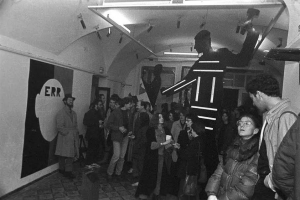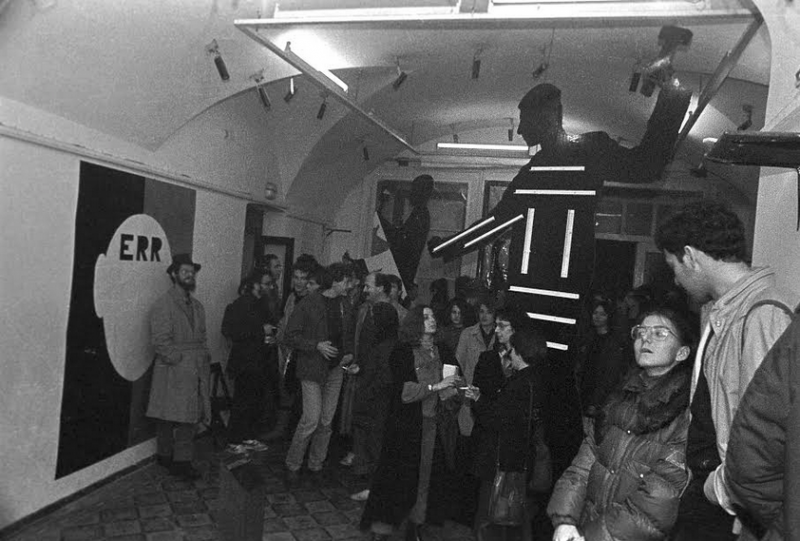
Participants: Zemira Alajbegović Pečovnik, Barbara Borčić, Neven Korda, Marko Kovačič, Dušan Mandič; moderator: Sezgin Boynik.
Discussions about civil society in 1980s Slovenia focused on many different issues, such as nationalism, independence, democracy, and repression. But in addition to these normative discourses the decade also saw the rise of punk and the alternative scene, along with a broad range of theoretical works and the emergence of novel forms of artistic expression.
In the panel we will discuss the 1980s on the basis of the contradictions and tensions that arose in this period, with on the side a move towards a nationalistic recapitulation (as seen in the journal Nova Revija), and on the other a difficult-to-classify yet clearly alternative definition of civil society.
In order to clarify what form this alternative view of civil society took, we will start by discussing the roles the punk and hard-core movements played in this process. By looking back we will try to understand the radical breaks that these introduced to the alternative scene in Slovenia.
Another topic for discussion is the role of historical-materialist and psychoanalytic theories, and thus the influence of Slovenian Althusserian–Lacanian theories on the alternative movement. Such theoretical works introduced a strong critique of the normative and bourgeois understanding of ideology, and this is especially important for understanding the transformation of concepts such as democracy and freedom that were crucial for the debates over the meaning of civil society that took place in this era, and beyond. My point of departure here is that the definitions and expressions of democracy and freedom were completely different in the alternative and normative approaches to civil society, as will clarified by this panel.
Other possible topics of discussion include the following issues:
Sezgin Boynik (1977) lives and works in Helsinki. He completed his PhD at Jyväskylä University’s Social Science Department on the topic of “Towards a Theory of Political: Art Cultural Politics of ‘Black Wave’ Film in Yugoslavia, 1963-1972”. He has published works on punk, the relation between aesthetics and politics, cultural nationalism, the Situationist International movement, and Yugoslavian cinema. He co-edited the reader Nationalism and Contemporary Art (with Minna L. Henriksson, Rhizoma & EXIT, Prishtina, 2007), and co-authored with Tolga Guldalli the book An Interrupted History of Punk and Underground Resources in Turkey 1978-1999 (BAS, Istanbul, 2008). Recent articles include “New Collectives” (Retracing Images, Brill, Boston & Leiden, 2011), “Cultural Policy of Dusan Makavejev” (Kino! Journal No. 15, Ljubljana, 2011), “Discontents with Theoretical Practices in Contemporary Art” (Journal of Visual Art Practice 10:2, London, 2011), “Art of Slogans – in two parts”(TKH No. 19 and 20, Belgrade, 2012), “Dimitrije Tucovic i Srpsko-Albanski ‘Istoricisticki’ Odnosi” (Cenzura d.o.o., Novi Sad, 2013), “Social Surrealism: Historical-Materialist Theses on the Mystery of Art” (Open Space Journal, Vienna, 2013) and “Marxist-Leninist Roots of Zenitism” (Filmkollektiv, Frankfurt, 2013). Boynik has also produced a number of art-books, such as Counter-constructivist Model (co-authored with M.L. Henriksson, Labyrinth Press, Stockholm, 2012), Still Stealing Steel: Historical-Materialist Study of Zaum (Rab-Rab Publications, Tbilisi, 2014) and Noise After Babel: Language Unrestrained (Spector Books, Leipzig, 2015, forthcoming). Boynik is also editor of Rab-Rab: Journal for Political and Formal Inquiries in Art.
In addition to his publications, Boynik is active as a conceptual artist, and his installations include On Lenin: Atlases, Herbariums and Rituals (Anders Bergman Galleri, Helsinki, 2012).

Back to the USA, photo by Barbara Borčič